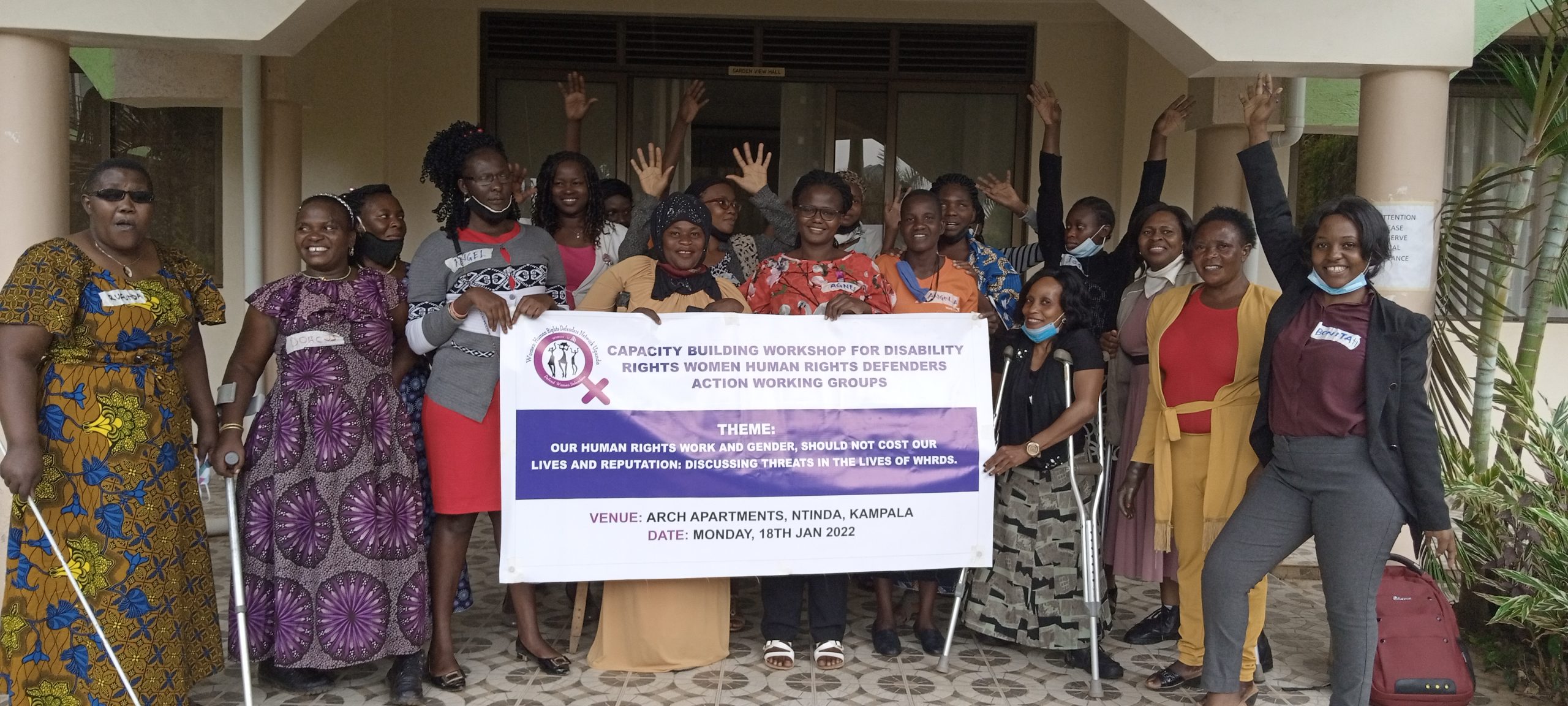On 18/01/2022 Women Human Rights Defenders Network Uganda (WHRDN-U) organized a workshop for 15 disability Women Human Rights Defenders (WHRDS) at Arch Apartments in Kampala, who continue to face stigmatization, discrimination, torture and sexual violence because of their disability and human rights work.
The workshop aimed at raising the visibility of conditions violations faced by disability WHRDS, share best practices for the protection and encouraging solidarity among WHRDs.
The workshop began with a reflection on a journey of being a defender led by Ms. Asingwire Bonita from WHRDN-U, which she termed the “River of life”. Bonita explained different ways how a river flows. “The river flows calmly, and this is when people want to sit by the banks and feel the breeze. Some seasons of a river come with waves, at this point, no one wants to come or sail on it. A river sometimes flows on narrow paths, this causes it to hit the banks. But finally, if find it way and flows. She further asked participants to relate their journey as women human rights defenders to that of a river.
Angella a WHRD from Arua mentioned that she started her journey after she received funding of one million shillings from NOWUDU. Members in her organization attacked her saying she ate the money. She almost gave up but continued to do the right thing until members understood and elected her as their leader. Chelain Dorcus a WHRD fighting against FGM shared girls and women came to her home during the time of circumcision. Her husband ran way saying he can’t support children that are not his. People in the community told her that she is a cursed woman went on to contest for counselor position which she won.

Bonita Asingwire leading a session on river of life.
While leading a session on the risks and attacks, Ms. Kabagenyi Peluce, shared some of the threats disability WHRDS face. “We Women with Disability human rights defenders, we face double oppression, disability-based discrimination, and gender-based discrimination. We face stigma associated with being disabled, a woman and WHRDS. This has significant impact upon our lives as Women with Disability human rights defenders. Because of our human rights work, some perpetrators use aids to physically hurt us and use our aids to sexually assault us. This is intended to silence us. “I was following up a case of a girl who was raped by a soldier at Bwera boarder, when I showed up at the police, one police man said ‘now you with one hand what can you do”. Peluce explained.
She emphasized that although they face these risks, there is a need always to speak out so that people can understand challenges disability WHRDS face because safety is crucial for WHRDS.
Joy Rufunda one of the participants share that disability WHRDs who are visually impaired are bullied when they go to report cases to the police. Policemen tell us, ‘How will you recognize a person? How can we catch the person’. We do not get justice in most cases.

Peluce Kabagenyi facilitating on the risks and attacks disability WHRDS face.
The workshop also involved a session on selfcare and wellness where Bonita Asingwire led participants into the 30 days selfcare challenge that involved what they must do to get relief and enjoy their activism work. She emphasized the importance of selfcare saying that, human rights work is challenging and many defenders have continued to work in a trauma-based environment, violent, and fatigue. She encouraged them to take on this challenge in order get relief from stress that is likely to come along with their work.

Bonita Asingwire taking participants through selfcare session during the workshop
The workshop ended with female youth defenders sharing their lessons learnt with the secretariat as most of them learnt how to document and report cases, the types on violence they face and the importance of selfcare in their work. Youths also committed to recommend at least two members to the secretariat and reach out to fellow youth defenders in case they are attacked.

 Participants sharing their lessons learnt
Participants sharing their lessons learnt
